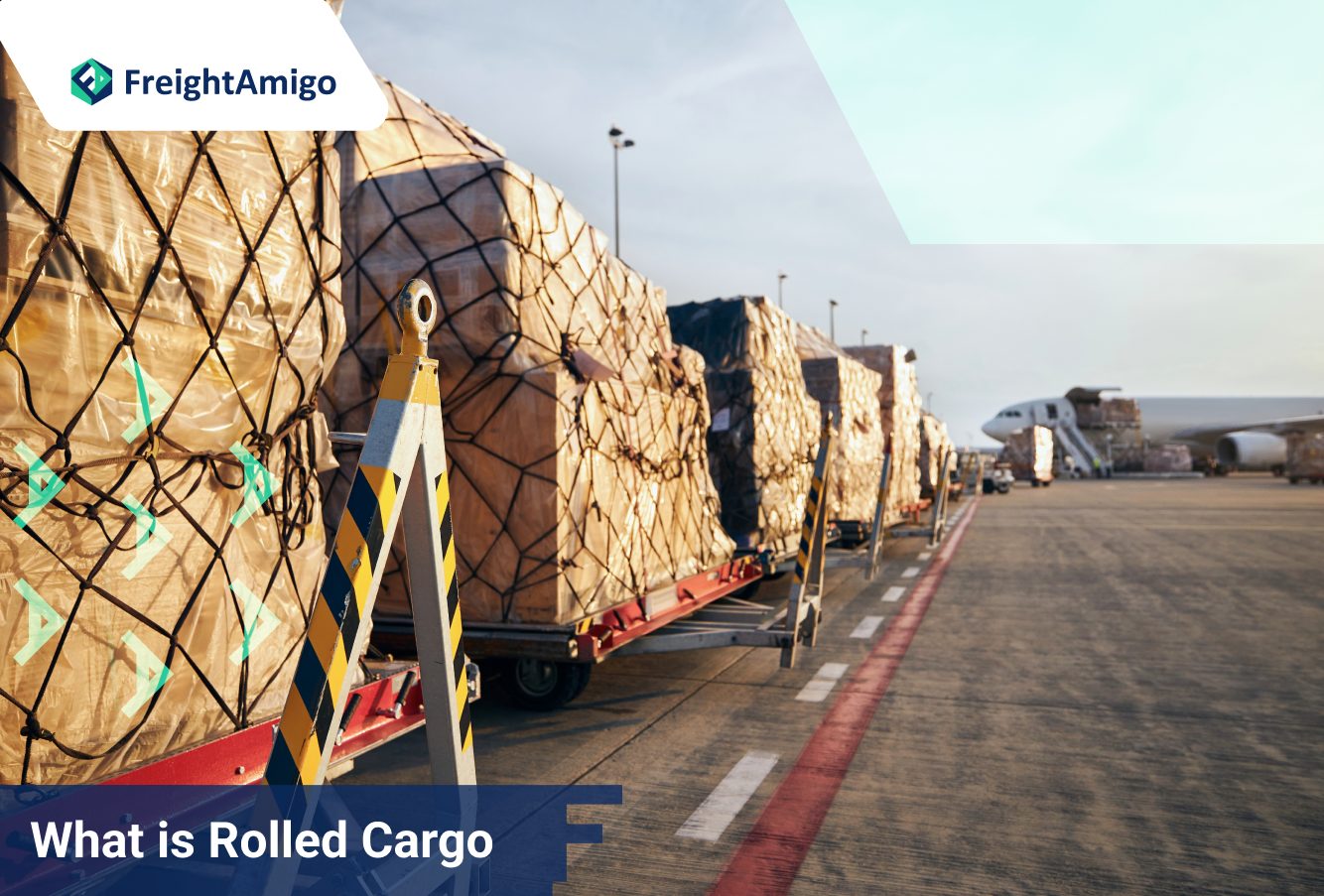What is Rolled Cargo: A Comprehensive Guide
Latest update on 22 March, 2024 by Aurora Park– Marketing Analyst at FreightAmigo
In the world of shipping and logistics, rolled cargo is a term that often comes up. It refers to the situation where cargo is not loaded onto the vessel it is supposed to sail on due to a lack of capacity. This can cause delays and disruptions in the supply chain, affecting both importers and exporters. In this comprehensive guide, we will delve into the concept of rolled cargo, the causes of it and solutions. FreightAmigo has written an informative article that explores the concept of rolled cargo, providing valuable insights for logistics professionals and business owners. Whether you are a logistics professional or a business owner, understanding rolled cargo and its implications can help you navigate the complexities of the shipping industry and ensure smooth operations.
Want To Compare The Best Express, Air Freight, Sea Freight, Rail Freight & Trucking Rates So As To Have Better Control On Cost?
Introduction
In the world of international trade, shipping plays a vital role in transporting goods across borders. However, the process is not always smooth, and one common challenge faced by importers and exporters is rolled cargo. Rolled cargo refers to the situation where cargo is not loaded onto its scheduled vessel due to a lack of capacity. This can occur for various reasons, ranging from overbooking to vessel schedule disruptions and paperwork problems. Understanding the concept of rolled cargo and having effective strategies to manage it is crucial for businesses involved in global trade.
What is Rolled Cargo?
Rolled cargo, also known as a cargo rollover, occurs when a vessel sets sail without picking up a shipping container as scheduled, resulting in a delay for that cargo. This situation can cause significant disruptions in the supply chain and impact both importers and exporters. The exact reason for the rollover can vary, but the goal is to get the cargo on the next available vessel as soon as possible to minimize delays.
Causes of Rolled Cargo
- Overbooking of Cargo: Overbooking is a prevalent cause of rolled cargo, similar to how commercial airlines manage seat allocations. When a vessel exceeds its capacity due to excessive bookings, cargo containers may be left behind and subjected to further delays. This issue escalates during periods of increased shipping demand, compounding the challenge of rectifying the situation and prolonging the duration needed for recovery.
- Exceeding Cargo Weight Limits: Containers that surpass the vessel’s maximum weight capacity are left behind to comply with safety and regulatory standards. Overloading containers can lead to stability issues or structural stress on the vessel, endangering the safety of the crew, cargo, and the vessel itself.
- Vessel Schedule Disruptions: Disruptions to a vessel’s planned itinerary can result in cargo being rolled, often unrelated to the specifics of the shipments themselves. Operational decisions or constraints may cause vessels to bypass scheduled port calls, leading to containers being rolled to the next available shipment. Factors such as adverse weather conditions, vessel weight limitations, technical glitches, mechanical failures, or congestion at ports can further complicate the schedule.
- Incorrect Documentation: Errors in cargo documentation can halt the loading process until the paperwork is corrected, potentially missing the vessel’s departure. Mistakes in cargo declarations or other paperwork can trigger delays during customs processing, underscoring the importance of meticulous attention to documentation well in advance of the departure date.
- Customs Clearance Disputes: Issues arising from customs can prevent a container from being loaded onto a vessel until the dispute is resolved. Discrepancies in documentation, valuation, or compliance with import/export regulations can require timely intervention to prevent shipping delays.
- Transshipment and Lesser-known Destinations: Containers that need to be transferred across multiple vessels to reach their final destinations are particularly susceptible to being rolled. Coordinating successive vessel transfers, especially to ports that are less commonly served, increases the likelihood of logistical hiccups. Limited shipping schedules and intricate scheduling and space allocation requirements amplify the potential for delays and subsequent rolling of cargo.
- Mechanical Problems with a Vessel: Unexpected mechanical issues can lead to the rescheduling of cargo to ensure safety and adherence to maritime regulations. Engine failure, problems with navigation systems, or other mechanical failures directly impact a vessel’s ability to operate safely and efficiently. Focusing on safety can lead to delays as cargo may need to be transferred to a later voyage to accommodate necessary repairs or maintenance.
Preventing Rolled Cargo: Strategies and Best Practices
Preventing cargo from getting rolled is pivotal in maintaining the efficiency and reliability of the supply chain. While it’s challenging to completely eliminate the risk of shipment delays, adopting certain strategies can significantly reduce this likelihood and help manage any disruptions more effectively.
- Early Booking: Secure your shipment slot well in advance to allow ample time for gathering and verifying all necessary documentation. This proactive approach can help avoid last-minute hassles and potential rollovers.
- Flexibility in Sailing Dates: Maintaining flexibility with shipping dates serves as a safeguard against unforeseen delays. By not locking into a single sail date, you increase your chances of finding alternative shipping options should any issues arise.
- Avoiding Peak Seasons and Major Holidays: Planning shipments outside high-demand periods, such as peak shipping seasons and major holidays, can reduce the risk of cargo being rolled due to space limitations.
- Minimizing Transshipments: Containers routed through transshipment points are at a significantly higher risk of experiencing rollovers. Opting for direct routes whenever possible reduces the complexity and likelihood of delays or scheduling conflicts.
- Splitting Your Bill of Lading (B/L): Distributing your shipment across several Bills of Lading can minimize the impact of rollovers. By diversifying your shipment, you increase the likelihood that unaffected parts can proceed as planned, mitigating the overall impact on the delivery schedule.
- Managing Documentation Requirements: Thorough and accurate management of documentation is crucial in preventing shipping delays and rollovers. Ensure all required paperwork is completed accurately and submitted in a timely manner to facilitate a smooth customs clearance process.
- Partnering with a Reputable Freight Forwarder: Collaborating with an experienced freight forwarder can mitigate the risk of cargo rollovers. They can provide valuable advice on avoiding issues, assist in rerouting shipments, and negotiate with carriers to secure spots for your cargo.
By implementing these strategies, shippers can enhance the predictability and reliability of their cargo shipments, even in the dynamic and sometimes unpredictable realm of maritime logistics.
Conclusion
In conclusion, rolled cargo poses a complex challenge in the maritime logistics industry. However, by understanding its causes and implementing strategic measures, shippers can significantly mitigate its impact. Early booking, flexibility in sailing dates, and working with reputable freight forwarders are effective strategies that shippers can employ to reduce the likelihood of experiencing rolled cargo. Additionally, the importance of supply chain visibility cannot be overstated, as it equips shippers with the necessary insights to plan proactively, respond to potential disruptions, and refine their shipping practices. By adopting these approaches, shippers can enhance the resilience of their supply chain operations, ensuring smoother, more reliable delivery of cargo despite the dynamic and sometimes unpredictable nature of global shipping logistics. FreightAmigo can provide valuable expertise and solutions to businesses grappling with the challenges posed by rolled cargo in global trade.
There Are Different Options For Cargo Transportation. If You Want To Choose The Most Convenient And Suitable Solution, It Is Best To Have The Full Support Of Logistics Experts! If You Are Planning To Ship Goods Overseas, Please Go To The FreightAmigo Page For Inquiries.
Read More:
Route Optimization in Cargo Transportation | FreightAmigo
Environmental Impact of Freight Route Optimization | FreightAmigo
Data-Driven Cargo Insurance | Future & Revolution | FreightAmigo
If you have any inquiries on logistics/supply chain, feel free to contact FreightAmigo now:
Chat with us online | Hotline: +852 28121686 | WhatsApp: +852 27467829









































